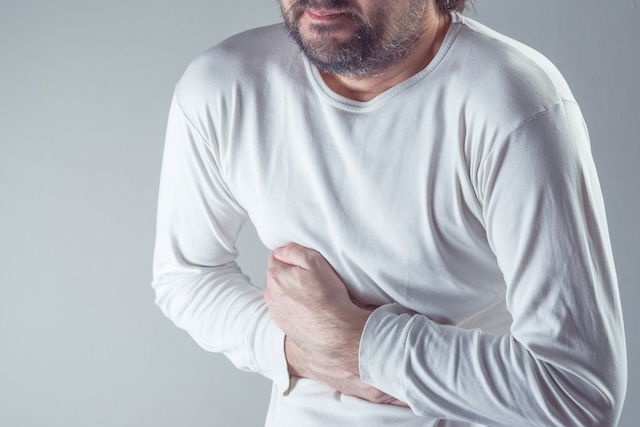Crohn’s disease is a condition that affects the digestive system. It causes chronic inflammation of the intestinal lining, and can be caused by genetic factors or by immune system dysfunction.
This illness can cause symptoms like intestinal irritation, anal bleeding, sensitivity to certain foods, diarrhea and abdominal pain. These symptoms can take months to years to appear, which makes Crohn’s disease difficult to diagnosis.
Crohn’s does not have a cure, but there is treatment available to help manage symptoms and improve quality of life. Treatment should be done under the supervision of a nutritionist and/or gastroenterologist.

Possible causes
The causes of Crohn’s disease are still not completely well-known, however there are factors that are common amongst those with Crohn’s disease. These factors include:
- Genetic factors may influence the development of Crohn’s disease. It is common for a person with Crohn’s to have a family history of it.
- Immune system dysfunction, due to an overactive response during an infection, which may cause immune cells to attack the digestive system
- Changes to intestinal flora, which can cause an imbalance in the bacteria present in the intestines
- Frequent smoking, because cigarettes contains harmful substances like nicotine, carbon monoxide and free radicals that can affect intestinal blood flow. This can increase the risk for Crohn’s to develop, or may cause more flare-ups.
This condition can appear at any time, but it emerges most frequently during periods of greater stress or worry. Crohn’s disease can equally affect men and women. It may also be related to the use of medications like oral contraceptives, antibiotics or anti-inflammatories like ibuprofen or diclofenac.
Common symptoms
It may take months or years for the first symptoms of Crohn’s disease to emerge. It all depends on the extent of inflammation in the intestines. In some cases, some people may actually have a symptom or two, but do not suspect Crohn’s, as many of the symptoms can be confused with other gastrointestinal issues.
Although symptoms can vary from person to person, the most common ones include:
- Heavy and persistent diarrhea
- Pain in the stomach area
- Blood or mucus in the stool
- Frequent abdominal cramping
- Sudden urge to poop
- Frequent fatigue
- Persistent fever (between 37.5ºC to 38ºC, or 99.5ºF to 100.4ºF)
- Unexplainable weight loss
These symptoms typically come and go, and are known as flare-ups. Symptoms can be in remission at times, and then come back again.
In some cases, this condition can also affect the eyes (causing swelling, redness, and light sensitivity) and can increase the patient's risk for colon cancer.
Online quiz for Crohn’s symptoms
If you think you have Crohn’s disease, confirm your symptoms below to assess your risk:
There is no cure for Crohn's disease, but there is treatment aimed at improving the symptoms. Treatment should be done under the supervision of a gastroenterologist and a nutritionist.
How a diagnosis is confirmed
The initial diagnosis of Crohn’s disease should be made by a family doctor or gastroenterologist. He or she will assess the signs or symptoms present, and evaluate whether the patient has a family history of Crohn’s. In addition, the doctor may complete a physical exam and order lab tests.
To determine how severe the Crohn’s disease is, imaging may be ordered, and is typically completed via a colonoscopy. A colonoscopy is a procedure which allows for the assessment of the intestinal walls, to see whether there are any signs of inflammation. During a colonoscopy, the doctor will typically obtain a small specimen for biopsy, and a diagnosis can then be confirmed.
In addition to a colonoscopy, an endoscopy can also be ordered, particularly when there are signs and symptoms of upper intestinal inflammation. The doctor may also recommend an x-ray, abdominal ultrasound, MRI or CT-scan. These imaging tests are usually recommended to assess for fistulas or other abdominal abnormalities.
Treatment options
Treatment for Crohn’s disease should be done under the supervision of a gastroenterologist and a nutritionist. Treatment goals are aimed at reducing the intestinal inflammation that is causing symptoms, improving quality of life, and reducing risk for complications.
A balanced diet with healthy food choices is also recommended to complement indicated treatment.
The main treatments utilized in Crohn’s Disease management are:
1. Medication use
Medications used in the treatment of Crohn’s disease should be prescribed by your gastroenterologist. They are usually indicated to alleviate symptoms or to prevent flare-ups. Common medications include:
- Corticosteroids, like prednisone or budesonide, to reduce intestinal inflammation
- Aminosalicylates, like sulfasalazine or mesalazine, which reduce inflammation prevent flare-ups
- Immunosuppressants, like azathioprine, mercaptopurine or methotrexate, which help to reduce immune response, and can be used in cases where other medications are not effective
- Biologics, like infliximab, adalimumab, certolizumab pegol or vedolizumab, which help to regulate immune response
- Antibiotics, like ciprofloxacin or metronidazole, which can be used when Crohn’s complications occur due to infection, bacterial overgrowth or a perianal condition.
Additionally, other medications can be used to relieve specific symptoms like diarrhea or pain. Vitamins or supplements can be recommended in cases where deficiencies are present due to ineffective nutrient absorption.
2. Diet and nutrition
Intestinal inflammation that is caused by Crohn’s disease can negatively affect digestion and nutrient absorption. This can lead to diarrhea, abdominal pain and can even impact growth in children. Therefore, a balanced diet as recommended by a nutritionist or dietician is important. Food that can worsen symptoms (like coffee, chocolate or raw greens) should be avoided.
If adequate nutritional intake is still not achievable through a diet, a doctor may indicate a liquid supplement which is administered enterally or parenterally.
3. Surgery
Surgery may be recommended by your doctor of diet changes or medications have not effectively improved the symptoms of Crohn’s disease. Surgery may also be indicated if complications arise, such as fistulas or bowel obstructions..
Surgery typically involves removal of damaged intestines.






























